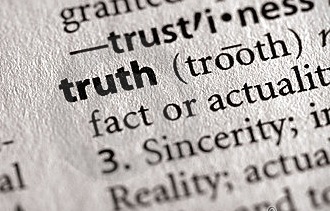 Truth and honesty are values that most parents want to pass on to their children. American history is replete with treasured folktales such as, “Honest Abe, he walked miles to return a penny to a widow.” And honest George Washington’s tree-chopping confession, “Father, I cannot tell a lie. It was I.”
Truth and honesty are values that most parents want to pass on to their children. American history is replete with treasured folktales such as, “Honest Abe, he walked miles to return a penny to a widow.” And honest George Washington’s tree-chopping confession, “Father, I cannot tell a lie. It was I.”
But what do we tell our children about truth and honesty now, and where do we look for modern examples? To corporations, such as banks? To politicians, lobbyists, the “one percent”? To our political parties and governments? To the television, radio, newspapers? Hopefully, to our schools, and our children’s’ teachers…
Today, who stands up for truth and honesty, stripped of self-interest and bias? In the current toxic atmosphere, people are always promulgating their own view as THE correct one, defending it and attacking “the other.” There appears to be no middle ground, and the only objective is to gain advantage—not to promote truth and honesty. This kind of behavior has become so blatant that no one is even embarrassed to distort facts or lie outright. When someone of leadership status makes a speech or public statements that impartial fact-checkers find to be distorted or untrue, no one is ashamed. As often as not, the misstatements or untruths are just repeated.
In Nazi Germany, Joseph Goebbels stated, “If you tell a lie big enough and repeat it often enough, people will believe it to be true.” We’re all in serious trouble when people—entire societies—become inured to feelings of guilt and shame and able to lie with impunity and without conscience.
In law, in medicine, in relationships, and inside ourselves the truth is our protection. Without truth, what kind of world would we inhabit? What could we agree upon? When the truth is irrelevant you have chaos. We set our children on a path, one would hope, to contribute to this shared world and live a life that is worthwhile and fulfilling. They learn from us and we learn from each other. Philosophers will argue that truth is often just a matter of belief—relative, not absolute. We adults can debate that point forever, but our children will follow the truth they observe in our behavior.
Takeaways:
- Truthfulness protects our relationships
- Without truth there is chaos i.e. the absence of trust and connection.
- Children learn truthfulness from how their parents behave more than from what they say.
Oliver & Barbara
